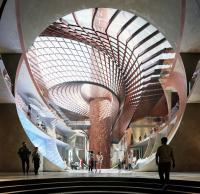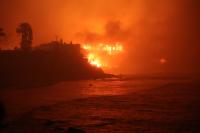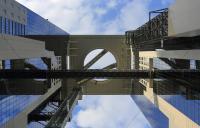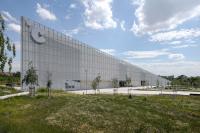Residences and Collective Houses
Brescia, Italy
The architectural design elaborated here interprets as a key factor the urban environment in which it is positioned. As a basis, it has a relation both with the southern part of the Tarello park and with the neighbouring axis of via Lamarmora. in a context of single isolated macro-objects, many of which have a clear vertical characterization, the recent intervention of the Forum and the Lombard Bank emerge, together with the Tarello park, which form a partial urban identity.
To enhance this condition, a new principle of urban development is proposed, with the idea of continuity of space, where the proposed architecture measures, conforms and structures the space of reference.
The building designed therefore doesn’t appear as an object in a suspended plot, but as an element that builds the place, coherently integrating open, built and relational spaces. the extended scale of the project makes it possible to iden- tify an urban construction method that goes beyond the atopic fragmentation present in the context.
The architectural work is self-contextualized in such a way that it builds the place, opposing measure and identity to dispersion and peripheralization, without falling into a regressive historic interpretation.
in this case, being a strong presence is an intrinsic state of an extended and overtly volumetric building. however, its form and its material are interpreted as an idea of living, an expression of lightness.
Though it does not give up its privacy, the building generates a series of light and shadow effects, with material signs filtered by transparencies and glass opacity and diluted by the vegetation that emerges by reflection. to the southern part of the building, the architecture defines a precise urban relationship with Via Lamarmora, facing it perpendicularly.
its split structure expands towards the north and the park, while to the south it opens with a paved square between the road axis and the adjacent building, giving rise to two public spaces with different characteristics and recognizable at the service of the community the building is also detached from the ground, creating a permeability that integrates the different parts.
- Architekci
- ARW Associates - Botticini + Facchinelli
- Location
- Brescia, Italy
- Year
- 2012
- Client
- Europa Risorse S.r.l.
- Team
- Arch. Eleonora Zucchelli, Arch. Francesca Bignardi, Arch. Michela Cibaldi, Arch. Marzia Mainardi, Arch. Federica Mometto, Arch. Cristina Sipolo, Geom. Ignazio Marchetti, Arch. Alessandro Alberti, Arch. Alessandro Galperti, Arch. Camillo Botticini, Arch. Giulia de Appolonia (ABDA S.r.l.), Arch. Paolo Pasquini (Europa Risorse S.r.l.)










